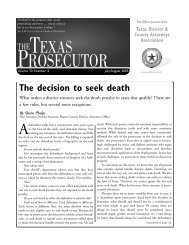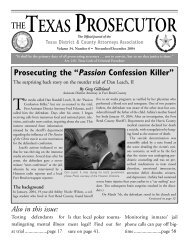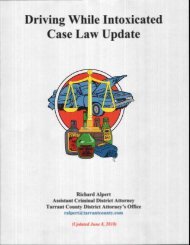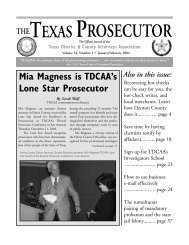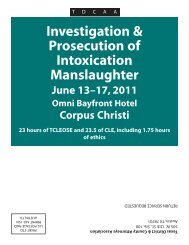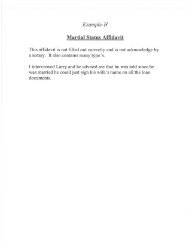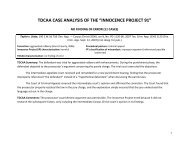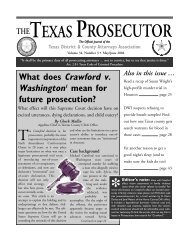Driving While Intoxicated Case Law Update - Texas District ...
Driving While Intoxicated Case Law Update - Texas District ...
Driving While Intoxicated Case Law Update - Texas District ...
Create successful ePaper yourself
Turn your PDF publications into a flip-book with our unique Google optimized e-Paper software.
where police officer noticed severalsrgns of intoxication including alcoholic odor coming from<br />
vehicle, driver's refusal to make eye contact with officer , driver's refusal to roll down window,<br />
driver's response that he had consumed two to four beers when asked if he had been drinking, and<br />
driver's refusal to take field sobriefy fesfs. The totality of the circumstances r's substantial evidence<br />
of probable cause for Nielsenb arresf.<br />
Lonsdafe v. State. 2006 WL 2480342 (Tex.App.-El Paso, 2006, pet. ref'd).<br />
Defendant challenged the admission of testimony that he refused to perform the field sobriefy fesfs.<br />
He complains that the evidence was irrelevant, and if relevant, more prejudicial than probative. He<br />
also points to violations of his constitutional rights, arguing that the invocation of the right to<br />
counsel, the rightto remain silent, and the right againsf unreasonable search and seizure may not<br />
be relied upon as evidence of guilt. The Court rejecfs fhese arguments and finds that a defendant's<br />
refusalto perform FSf's is relevant and admissible. Court further held that itwas proper argument<br />
that the jury could infer that his refusalwas evidence of intoxication.<br />
State v. Garrett. 22 S.W. 3d 650 (Tex.App.-Austin, 2000, no pet.).<br />
Defendant's argltment-which prevailed in the trial court- was that c/assic indicators of inebriation<br />
that would be present in a normal DWI arrest were absent in this case. We note that many of these<br />
factors such as pertormance on field sobriety fesfs, urere absent as a direct result of defendant's<br />
conduct, i.e., his refusalto participate in any of these tests. <strong>While</strong> we regard these missrng factors<br />
as a part of the totality of the circumstances, they are only a part, and where many of the missing<br />
factors are due to a defendant's conduct, we believe that the officers could reasonably consider<br />
that conduct as part of the totality of the circumstances that provided probable cause to arrest.<br />
Dawkins v. State. 822 S.W. 2d 668, 671 (Tex.App.-Waco,1991, pet. ref'd).<br />
ln prosecution for felony driving while intoxicated, admrssion of video tape which showed<br />
defendant's refusal to submit to sobriety tests requiring him to recite alphabet and to count aloud<br />
was not violation of defendant's constitutional privilege against self-incrimination. Evidence that<br />
defendant refused to submit to sobriety fesfs drd not constitute violation of defendant's<br />
constitutional right to be free from self-incrimination where there was no indication that defendant<br />
was compelled to perform the sobriety tests.<br />
Barraza v. State. 733 S.W. 2d 379 (Tex.App.-Corpus Christi, 1987, pet. granted) atfd 790 S.W.<br />
2d 654 (Tex.Crim.App.June 20, 1 990).<br />
Arequestto perform afield sobrietytest is sufficiently simitarto a requestto pertorm a breathalyzer<br />
fesf so as to allow an analogy to the law governing the admissibility of evidence of a suspecf's<br />
refusal to take a breathalyzer test. Both types of fesfs are designed fo fesf the sobriety of the<br />
suspecf. We can discern no reason to distinguish between them with regard to the admissibility<br />
of refusal to perform the fesfs.<br />
62



